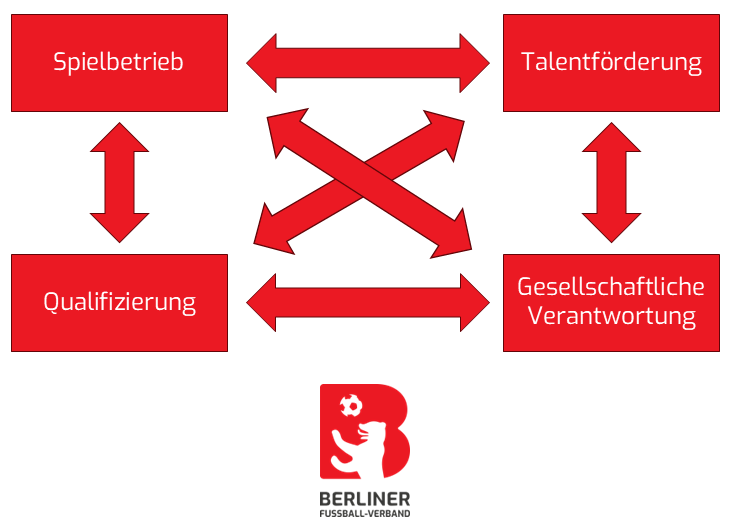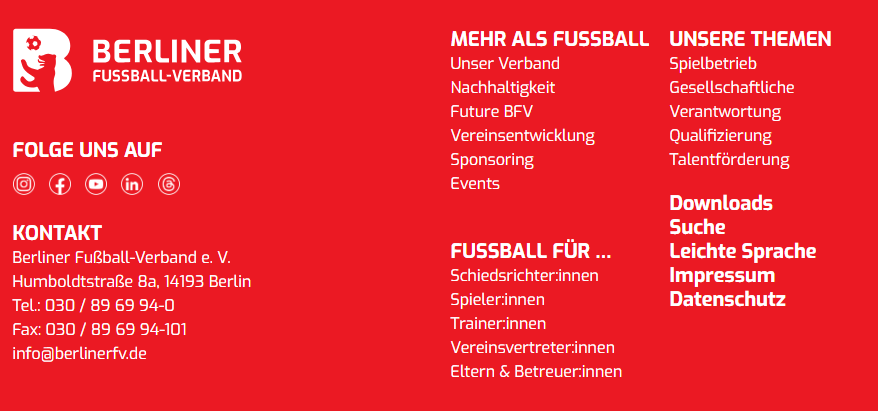Easy language
Welcome!
Here you will find information in plain language
about the Berlin Football Association, BFV for short,
and the website www.berliner-fussball.de.
The information in plain language has 3 parts:
1. about the BFV
2. Structure of the website
3. Tips for use
If you have any questions or ideas about our website,
, simply send an e-mail to info@berliner-fussball.de.
1. about the BFV
What is the BFV?
The Berlin Football Association, BFV for short, has been in existence since 1897.
It is the umbrella association for soccer in the state of Berlin.
This means that the BFV looks after all soccer clubs in Berlin.
There are currently 375 clubs with more than 170,000 members.
The BFV has around 50 permanent employees.
In addition, there are over 200 volunteers,
who work for the BFV in their free time.
They all take on the following tasks, for example
- Organizing the soccer matches
- Training the referees
- Participation in decision-making rounds and working groups on various topics
The BFV office is located in Charlottenburg-Wilmersdorf.
The BFV carries out its sporting tasks in Berlin-Wannsee,
mainly at the "Landesleistungszentrum Richard Genthe".
This is where, for example, the training of coaches takes place.
Many people have to work well together,
so that the BFV can accomplish its tasks and achieve its goals.
For example, the BFV works together with these organizations:
- German Football Association, DFB for short
- North-East German Football Association, NOFV for short
- Landes-Sport-Bund Berlin, LSB for short
The state of Berlin supports the BFV with money.
The BFV is also supported by sponsors.
What are the BFV's tasks?
The BFV employees have 4 main tasks.
These 4 main tasks are also called core tasks and are:
- The BFV organizes the league and cup matches
for around 3,300 soccer teams in Berlin.
Around 1,500 soccer matches take place in Berlin every weekend. - The BFV organizes talent development for children and young people.
There are 10 Berlin selection teams for children and young people.
In addition, there are 9 bases in Berlin,
which the BFV operates for the German Football Association.
The BFV provides talent development through training
for coaches and referees. - In addition to sport, the BFV is also concerned with social issues.
For example, the BFV organizes anti-violence training courses.
and promotes the participation of children and young people,
who have only recently arrived in Germany.
The BFV regularly launches various campaigns to this end. - The BFV is also very committed to the further education and training
of employees and volunteers.
This core task is just as important as the other 3.
Because only with good further education and training
can the other 3 tasks be accomplished.
This diagram shows that the core tasks at the BFV are all interrelated:
What is important to the BFV in its work?
The BFV supports the soccer clubs.
This is only possible if everyone works well together
and there are good conditions for this cooperation.
For example, these things are important:
- a clear distribution of tasks
- a great deal of specialist knowledge among the employees
- good training for the coaches
- good training grounds
- good networking of all those involved via the Internet
with state-of-the-art technology
The BFV always wants to work in such a way,
that the results of its work are also good in the future.
This includes openness, responsible use of money
and fair behavior towards partners in the cooperation
as well as environmentally conscious action.
Soccer is a team sport.
You can only win together.
This is only possible if you treat each other with respect.
This is important to BFV employees.
And this should also apply to all BFV members.
It doesn't matter in the team or when working at the BFV,
- whether someone was born in Berlin
or has only been here for a short time, - whether someone comes from a family with a lot or little money,
- what religion someone has,
- whether someone loves men or women or both.
The BFV is convinced
that as a sports association it can be a role model
for other areas of society.
What actions does the BFV take?
The BFV is not just about soccer.
We also want to take responsibility.
for living together in our society.
The BFV does this through a wide variety of activities.
For example:
- "Language is violence - show respect!"
This is a campaign against verbal abuse
and verbal violence towards girls and women. - "Little heroes"
This is a campaign to protect children
from violence by adults. - "Red Card for Homophobia"
This is a campaign against violence and exclusion
against lesbians and gays
in cooperation with the Lesbian and Gay Association Berlin-Brandenburg. - "FUSSBALL GRENZENLOS"
This is a campaign for the participation
of children and young people who have experienced flight.
In addition, the BFV has its own "Code of Honor"
to protect children and young people.
These rules of conduct in the Code of Honor apply to all persons
who work or assist at the BFV.
This is intended to protect children and young people
from all forms of violence:
physical, psychological and sexual violence.
What does the BFV do for people with disabilities?
We at the BFV want
everyone to be able to take part in soccer.
That's why the BFV supports soccer clubs in
offering sports activities for people with disabilities.
To this end, the BFV has published "recommendations for action"
for soccer clubs, for example.
There are suggestions on how such activities can work well.
But the BFV also has its own offers in this area:
Together with the Disabled and Rehabilitation Sports Association Berlin
, the BFV organizes the Scandic ID League.
This league is an offer for people with intellectual disabilities
and for people with mental illnesses.
A total of 25 soccer teams play there.
The league is called that,
because it is supported by the hotel chain "Scandic".
Since 2000, there has been a German championship
for workshops for disabled people, WfbMfor short.
Berlin WfbM teams can qualify for this
at a Berlin championship.
This Berlin WfbM championship is organized by the BFV.
The BFV works closely
with the state working community of workshops.
There are also the Football Friends Cups with inclusive soccer teams.
People with and without disabilities play soccer together.
Teams from soccer clubs,
schools and support facilities can take part in the tournaments.
Boys and girls can play together in mixed teams.
The Football Friends Cups are organized
by the state associations of the German Football Association.
Various Bundesliga clubs support the campaign.
If you have any questions about the inclusive sports offers and activities,
then simply contact the inclusion officer at the BFV:
Karl-Felix Heinz
Phone: 030 896 99 41 57
Email: karl-felix.heinz@berlinerfv.de

2. structure of the website
The selection for the main areas of the website can be found in the left margin:
"MORE THAN FOOTBALL" provides information on the association, club development and events.
Under "FOOTBALL FOR" you will find information on various groups of people in Berlin soccer:
- Referees
- Players
- Coaches
- Representatives of the clubs
- and parents & coaches
Under "OUR TOPICS" you will find information on the core tasks of the BFV:
- Match operations
- Social responsibility
- Qualification
- and talent development
At the bottom you will find these other areas:
- Social networks
- Contact Us
- downloads
- Search
- Easy language (You are currently reading this information.)
- Legal notice (This states who is responsible for this website.)
- Data protection (The website collects certain data. Here you can find out how your data is used)

Back to the start page
At the top left is the BFV logo.
If you click on it,
you will always return to the start page.
You will then leave the easy-to-read section.
Change page view
You can enlarge the view of the page.
To do this, press the "Ctrl" and "+" keys simultaneously.
If you want to reduce the view of the page,
then press the "Ctrl" and "-" keys simultaneously.
If you want to return to the normal view,
then press the "Ctrl" and "0" keys simultaneously.
Jump mark
The individual pages are sometimes very long.
If you are at the bottom of a page,
then you can always jump to the top of the page.
To do this, you must click on the jump marker:
* complete image source:
European Easyto-Read logo: Inclusion Europe. More information at
https://www.inclusion-europe.eu/easy-to-read/








